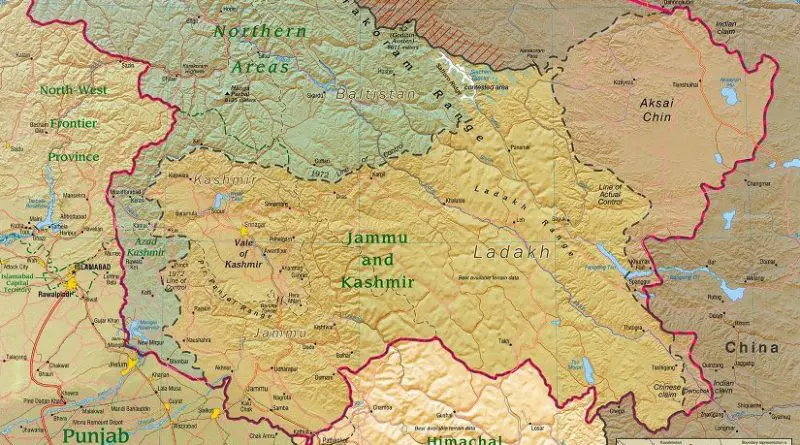India-Pakistan: Whither Surgical Strike? – Analysis
By IPCS
By Muhammad Faisal*
On 29 September, the Indian Army claimed that it had conducted a “surgical strike” along the Line of Control (LoC), in the Pakistani-administered region of Kashmir. Pakistani authorities, both civil and military, quickly rebutted it while confirming that it had responded to “unprovoked” ceasefire violations in four sectors along the LoC earlier that night. These developments came in the wake of deteriorating Islamabad-New Delhi relations with widespread unrest in the Kashmir valley. The present rise in tensions is a direct result of a militant attack on an Indian Army base at Uri, in the Indian-administered region of Kashmir. India blamed the attack on anti-India militants based in Pakistan, while Pakistan vehemently denied the accusation.
At present, details of what actually took place along the LoC are scant. Indian claims, however, still need to be taken with a pinch of salt. Yet, the Indian announcement is an admission of violating the ceasefire agreement. Pakistani sources confirm that Indian troops did attack a forward post in the Hot Springs subsector, of the Kotli sector. Indian soldiers taking advantage of physical features of the area had moved close to the Pakistani post and opened fire on the forward post. Pakistani soldiers swiftly retaliated. In the ensuing exchange of small arms and light weapons, the Indian attack was repelled by the Pakistani troops.
Earlier in the morning the Pakistan Army’s public relations department announced that Pakistani troops had responded to “unprovoked firing” on four sectors along the LoC during the early hours of the day. It was taken as return of “cross-LoC firing” by most Pakistani analysts and media, in the current volatile environment. In the currently prevailing hostile climate, cross-LoC firing and artillery exchanges were being anticipated by observers. The announcement made by the Indian DGMO and the spokesperson of India’s Ministry of External Affairs (MEA) that India had conducted a “surgical strike,” has obviously increased the tensions.
This Indian armed incursion is by no means a “surgical strike.” A surgical strike would mean Indian Army conducting an operation with “boots on ground” across the LoC, deep into Pakistani-administered territory, instead of a forward post. For such an operation, the Indian Army would either have to rely on heli-borne special forces or conduct airstrikes on selected targets using precision-guided munitions (PGMs). Based on the available information, at this time, the Indian military did not go for any of these options.
The DGMO of the Indian Army choose to describe a usual ceasefire violation and an attack on a forward Pakistan army post as a “surgical strike.” Most significantly, the Indian DGMO and the MEA spokesman deliberately used ambiguous language to announce violation of ceasefire and called it a “surgical strike.”
The Indian DGMO claimed that a “surgical strike was conducted along the LoC,” which means that Indian authorities are essentially claiming that Indian troops did not cross into the Pakistani-administered territory. Meanwhile, the stress on a “surgical strike” was enough to create ambiguity for political purposes. Some were quick to misinterpret this as “Indian boots on Pakistani held territory” scenario, which it certainly was not.
Moreover, it is also for the first time that India has admitted to violating the ceasefire agreement in place between the two armies. In the past, the Indian military had blamed the Pakistan Army for violating the ceasefire to assist infiltration across the LoC into the Indian-administered Kashmir. As India reverts to the situation reminiscent of the 1990s, questions would surely be raised by Pakistani military and Foreign Office on the future of the ceasefire agreement and its feasibility. So far, Pakistan has acted responsibly and has not undertaken a counter-attack on a forward Indian post along the LoC.
Pakistani Prime Minister Nawaz Sharif has called an emergency meeting of the cabinet to deliberate further steps, while Pakistani officials are vehemently denying that a surgical strike took place.
In rebranding a cross-LoC duel as a surgical strike, Indian military quickly claimed political victory that the Pakistanis have been punished for Uri attack. In a limited war, a side can attack first, but it cannot decide the course of action in the battlefield. Without waiting for the other side to respond first, acknowledge and respond to the “so-called” surgical strike. In Islamabad, this appears to be an attempt to assuage the domestic constituency by Indian Prime Minister Narendra Modi’s government. This, however, sets a dangerous precedent for the future where any side could claim to have undertaken a successful raid/attack and launch a media blitz, thus, worsening the already complex bilateral relations.
This attack has raised the prospect of a military escalation as the bilateral relationship takes a plunge and acrimony deepens. Even the future of the 2003 Kashmir ceasefire agreement that has largely kept the peace between two armies for nearly 13 years, is in jeopardy. The nature of this attempt is repeat of cross-LoC duels between the Indian and Pakistani Armies’ pre-ceasefire agreements. Both sides used to attack and capture posts on the opposite sides to gain tactical and operational advantage over the other. Former Indian and Pakistani military officers who have served in operational areas along the LoC during the 1990s have penned accounts of posts exchanging hands for tactical advantages. The latest Indian attack along the LoC can lead to return of violent 1990s when artillery duels were a regular feature of the conflict between Pakistan and India.
* Muhammad Faisal
Research Fellow, Center for International Strategic Studies (CISS), Islamabad


Will Pakistan at least admit that they lost East Pakistan in 1971?